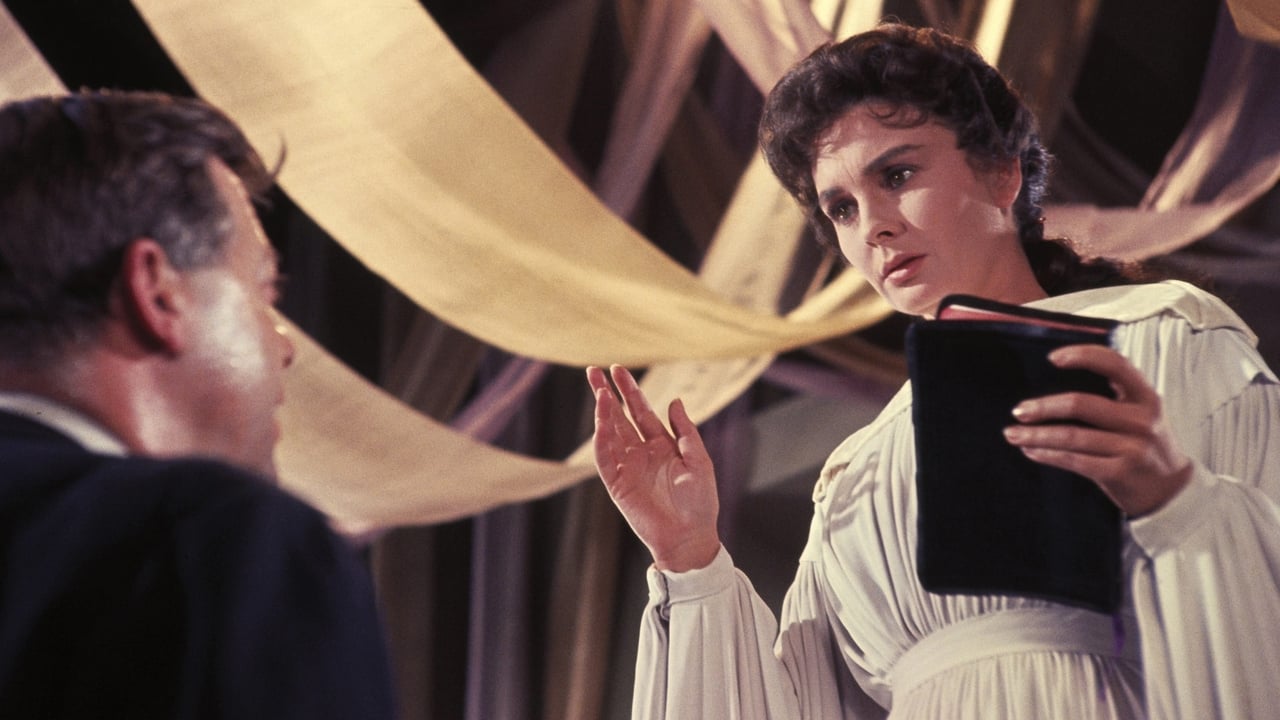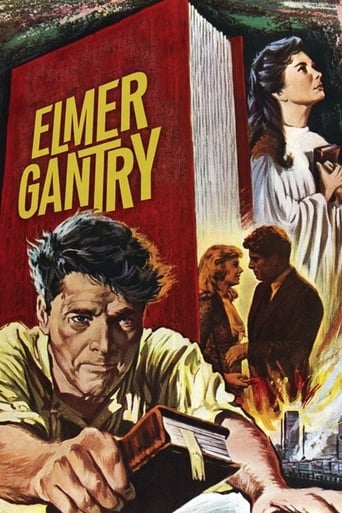Grimerlana
Plenty to Like, Plenty to Dislike
AnhartLinkin
This story has more twists and turns than a second-rate soap opera.
Neive Bellamy
Excellent and certainly provocative... If nothing else, the film is a real conversation starter.
Aspen Orson
There is definitely an excellent idea hidden in the background of the film. Unfortunately, it's difficult to find it.
vincentlynch-moonoi
I'm going to take the minority view here, although I see I am not alone...just outnumbered. I think this is an atrocious performance by Burt Lancaster...at least until the final third of the film. As several have pointed out...way over the top. More deserving of a Razzie than an Oscar. And, just for the record, there are lots of wonderful performances by Lancaster...this just isn't one of them.That's not to say this is a bad film. It's a strong script. All the more so in the last third of the film after things start going down for Mr. Gantry. And the closing scenes of the film are tremendous.But just as importantly, there are a number of wonderful performances here. In particular, I was impressed with Jean Simmons. And, I might add, it is rare that I am not impressed with her, even though her star has certainly faded over the years; but what a strong and impressive actress she was. Dean Jagger has long been a favorite character of mine, and no less so here. What a strong performance. The only miscasting I see is Patti Page; a wonderful singer, but a pitifully bland actress...as is reflected in her filmography of 3 titles; in reality, she's pretty much irrelevant here. Shirley Jones was quite acclaimed her, and although her performance is satisfactory, she's done much better in other films.This is a film that movie aficionados should watch...at least once.
A_Different_Drummer
... this one would have been one of the greatest ever, and would have better withstood the test of time. Story by Sinclair Lewis! Directed and adapted for the screen by Richard Brooks! Starring Burt Lancaster and Jean Simmons, both mega-stars. And -- get this -- a "supporting cast" that includes the likes of Patti Page, Shirley Jones and Dean Jagger. How can you go wrong? From my notes on a third viewing: 1. The adaption was major. Some literary experts felt the novel had been de-nuded. 2. The film has a backwards feel to it, that it, the earlier scenes where the characters are introduced feel more genuine than the contrived plot twists that come later. This is the sign of a project that ran away from the director. 3. Patti Page is seriously under-utilized (both as to voice and acting) and Dean Jagger always plays the same character, which can be both a benefit and a liability. 4. The key to this film is, was, and always will be Lancaster. Was this part written for him or did he adapt to the part? There is mystery indeed. Many if not all of the gestures and mannerisms attributed to Elmer are, coincidentally, the very same gestures and mannerisms that Burt was known for. Lancaster was one of the most physical actors of the period. He had hands the size of toasters. He was an ex-acrobat. Years before this film was made, he did a self-parody pirate film called the CRIMSON PIRATE. No one would have thought of giving him an Oscar for that film, but if you view the two side by side you will find that the gestures mannerisms and speech patterns are almost identical. 5. Lancaster was nearing 50 by the time this was made. To answer the question asked above, this reviewer does believe the part was written with him in mind; and moreover that Hollywood chose to honour him for his incredible body of work with the ultimate prize for this film. Nothing wrong with that, don't get me wrong, but, in this context you see the film is no longer one of greatest films of all times (awards notwithstanding) but rather one of the most over-acted and over-written films of all time. Big difference. 6. Later in life, Burt, actually one of my favourite performers, learned to act using the principle "less is more." Have a look at Scorpio, done over a decade later.
DangerAwesome
Elmer Gantry (Lancaster) is two different people. There's the person he is when it comes to religion and then he is a completely different, very flawed, human being when it comes to everything else. You name it and he's done it. To quote the film, "and how do I know there's a merciful God? Because I've seen the devil plenty of times!" (The close up on that shot is amazing)There's a reason Burt Lancaster won an Oscar for his performance as Gantry. It's one of the finest I've ever seen by any actor ever. He convincingly switches between passionate preacher and sinner. There's never any doubt that he believes what he preaches, though his preaching itself is sometimes a total lie.Is he duping the people when he does that? Yes. But is he causing any harm? His faith is not in question, he gives other people faith, is any of that a bad thing? Is it bad simply because he, at times, is a bad person? Is duping them necessarily a bad thing? It's a triumph of the film the way that it portrays a character with such seemingly conflicting morals, and portray him in a way that seems very realistic.What is the message of the movie? His and Sharon Falconer's revivalism starts out as simply giving people morals to abide by and faith in love and God. "A bountiful God, a generous God." That is certainly never a bad thing. However it takes a turn towards vigilante when Gantry leads a religious mob to raid liquor stores and brothels. It takes an even further, perhaps harmless, turn at the end with faith healing. Harmless until Falconer attempts to convince her churchgoers to not flee the burning church, because God will save them.Is the message of the film that religion is good until taken too far? Did God burn the church down because he disapproved of faith healing? Where is the line between religion being helpful and religion actually causing harm? It is the sign of a great movie when at the end I find myself asking questions like that. It is a rare quality.
campbell-russell-a
The exchanges between Elmer Gantry as played by Burt Lancaster and Jim Lefferts played by Arthur Kennedy is the what brings me back to this film time and again. They are pitted as enemies yet they understand each other as no other character in the film can. With a wry smile, Kennedy displays a grudging respect for Elmer's ability to manipulate crowds and twist logic to suit his purpose. "Jim Lefferts is an honorable man. But so was Brutus. And we all know that Brutus was an anarchistic, alcoholic assassin!" How can you argue with someone who is prepared to use such outrageous tactics? But it is when Elmer uses Jim's innate honesty to trap him into admitting his agnosticism that turns black comedy into a dramatic poignancy. "Do you believe Jesus Christ can give us life everlasting?" asks Elmer. "I'd love to believe it," replies Jim. The depth Kennedy brings to this line is moving beyond words but Elmer, rather than being moved, presses his advantage to assert that Jim's "confessed bigotry" has led to his attack upon Sister Sharon bringing revivalism to the town of Zenith. After Elmer destroys Jim with his street-fighter use of indefensible insinuation and blackmail, he declares he bares Jim "no malice". His outrageousness is so blatant that there is nothing Jim can do but raise his glass to Elmer.There are many other memorable moments in the film but two stand out for me. Elmer when on a crusade against sin dramatically orders the chief of police to "break down that speakeasy door" to which the chief replies in a bemused tone "Just knock. They'll open up".The other is when Elmer goes on his way at the end of the film. Jim's respect is again tweaked as Elmer absolves the crowd who beg him to forgive them for having ran instead of standing by Sister Sharon as she and her church burnt the night before. "That was inspired, " claims Bill Morgan, the ardent believer. 'Jim boy, do believe it was inspired? " Elmer asks Lefferts. "I think it was real friendly," Jim replies. He admires Elmer's humanity and sensitivity towards others because it is not just for show. Ultimately, Jim is moved by Elmer's honesty. "You really do believe in the Lord, don't you." Jim says this to Elmer not as a question but as a gesture of good will towards his greatest adversary and confidante.Elmer is an honest hypocrite and Jim can't help but like him.

